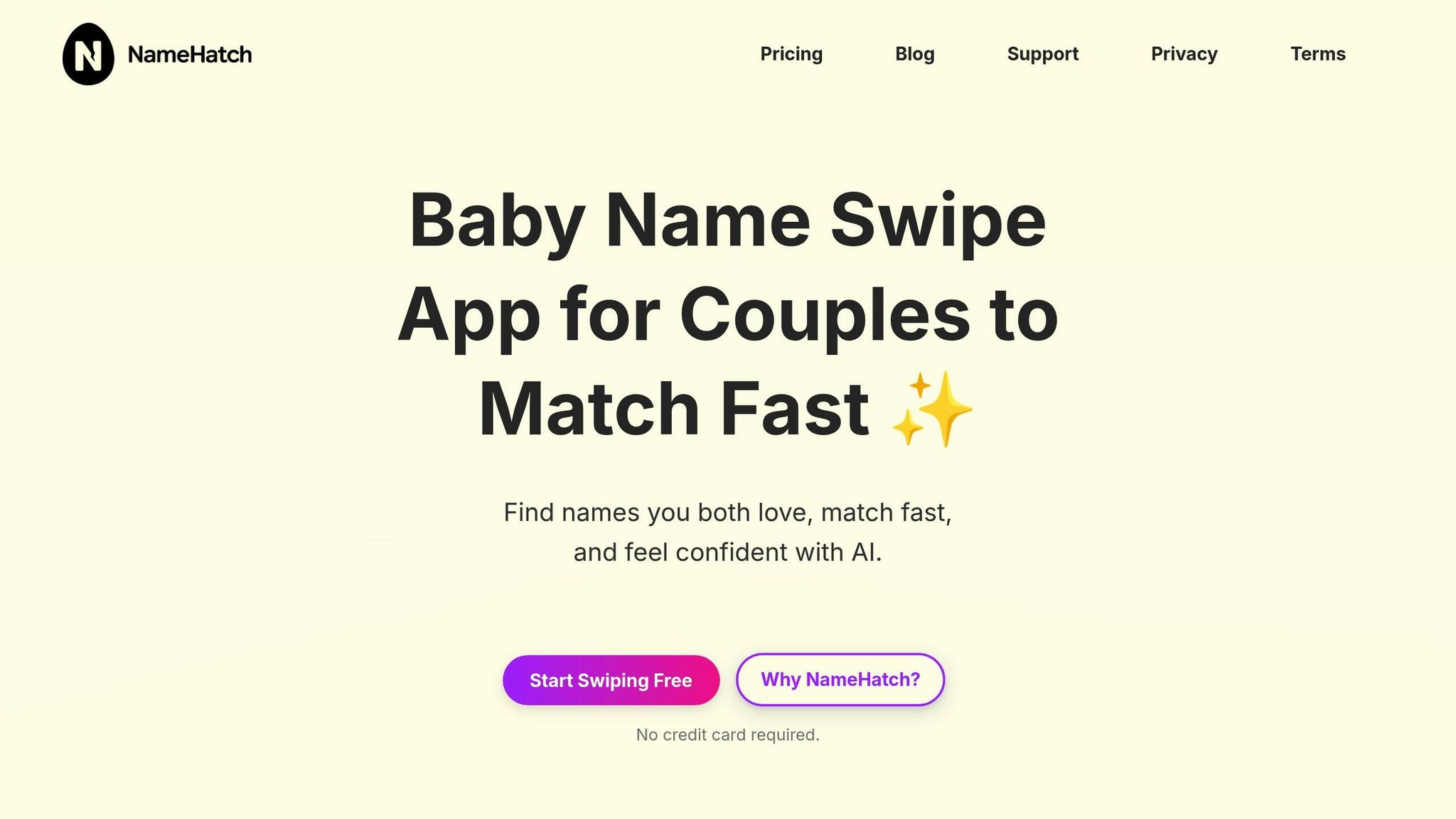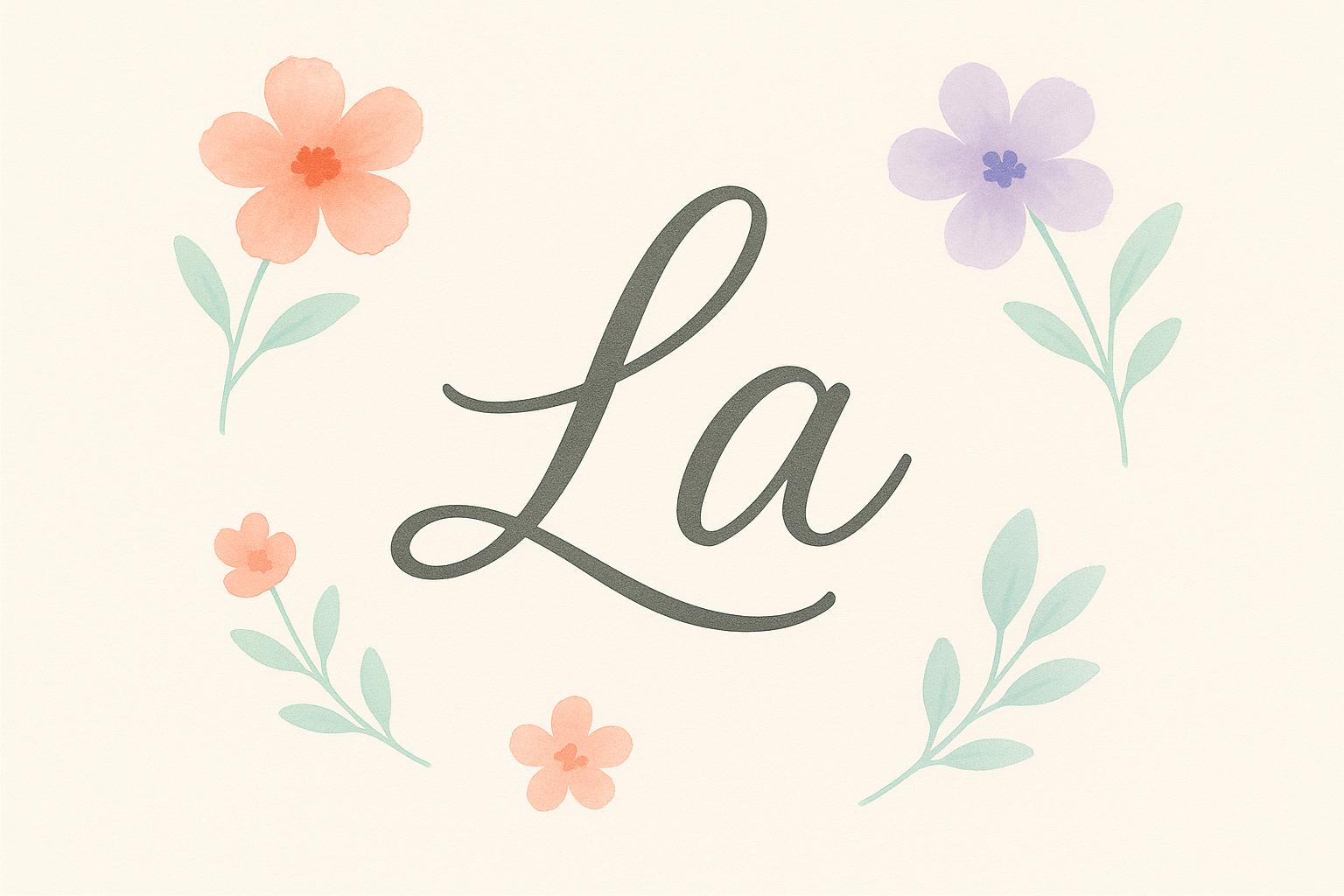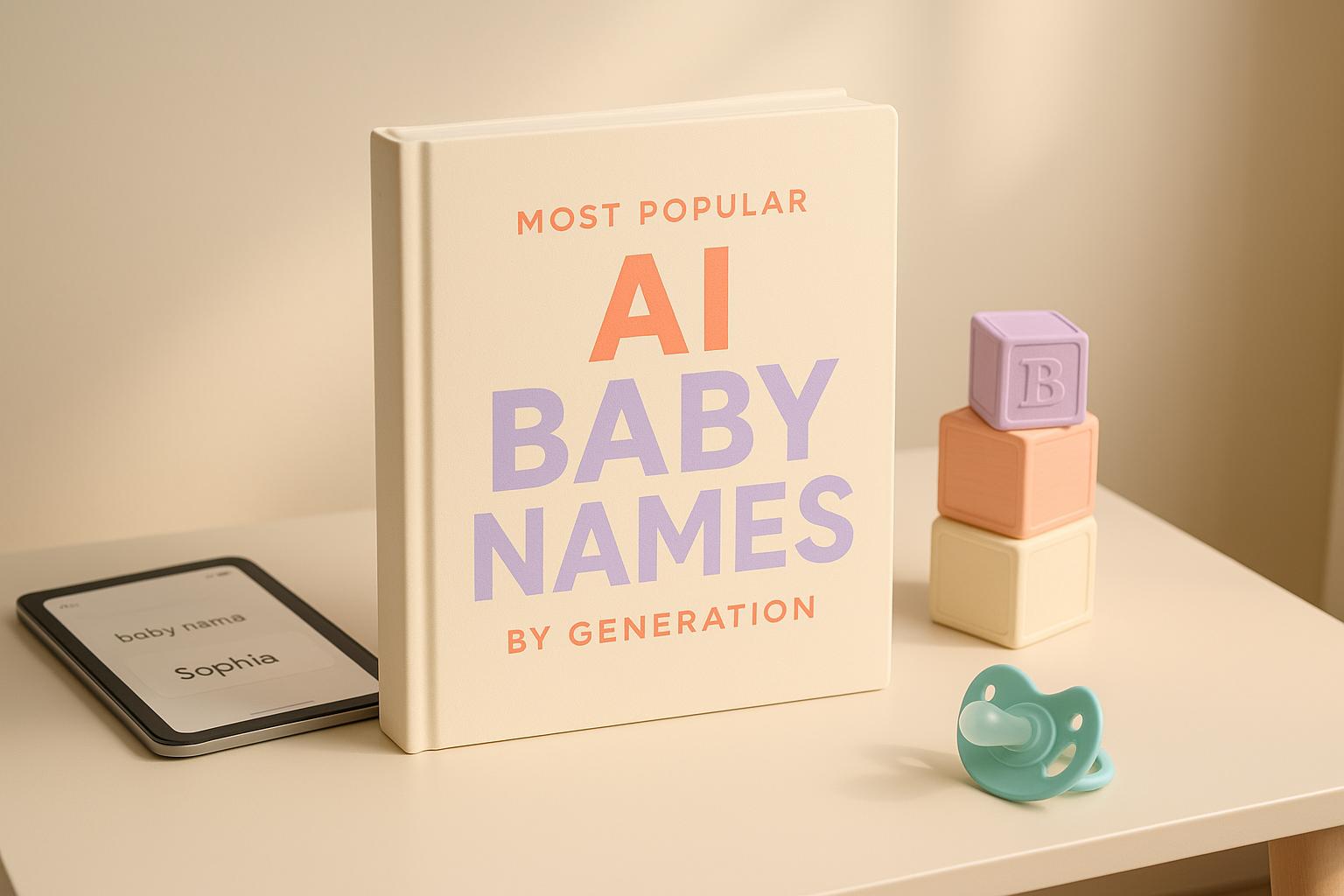Cross-cultural names have evolved significantly, reflecting shifts in values, identity, and global influences. Historically, names were deeply tied to ancestry, religion, and heritage. Today, parents prioritize names that blend backgrounds, are easy to use globally, and reflect individuality. Here's a quick breakdown:
- Older Names: Rooted in lineage, spirituality, and cultural traditions. Examples include names tied to saints, ancestors, or significant events.
- Modern Names: Focused on blending influences, gender-neutrality, and adaptability to diverse settings. Examples include unisex names like "River" or hybrid names that work across cultures.
Key Trends:
- Rise in gender-neutral names (up 88% between 1985–2015).
- Shift from rigid traditions to personal expression.
- Use of AI tools like NameHatch for finding meaningful names.
Modern naming reflects a balance between honoring heritage and fitting into a globalized world.
Naming Traditions Around The World
Historical Roots and Meaning of Older Cross-Cultural Names
Traditional cross-cultural names have long acted as vital links between generations, safeguarding cultural heritage and identity. These names weren’t chosen lightly - they carried deep meaning, honoring ancestors, preserving stories, and maintaining connections to traditions that might otherwise have been lost over time.
Family Heritage and Ancestry
Older naming practices often followed structured patterns that reflected family lineage and social status. Colie Christensen aptly describes surnames as “a testament to a family's journey through time, often encapsulating lineage, social standing, and occupation”. These patterns, which often incorporated family members' names or significant dates, were a way to honor ancestry and preserve lineage. Such practices laid the groundwork for the diverse traditional naming conventions seen across the globe.
Examples of Older Naming Practices
Across different cultures, names carried layers of meaning. They could signify protection, reflect social hierarchy, or mark significant events. For example, in ancient Egypt and China, names often symbolized societal roles or spiritual beliefs. Similarly, in Russia, religious traditions heavily influenced naming conventions. Many names honored saints, with a child’s name often determined by the day of the week they were born - boys born on Saturdays were frequently named Dmitry in honor of Saint Demetrios.
In African cultures, names were deeply symbolic, often tied to the circumstances of a child’s birth. Factors like the time of day, weather, or season played a role in name selection. For instance, the Igbo name "Chinonso" means "God is nearby", reflecting spiritual connections, while in Twi, "Kwabena" identifies someone born on a Tuesday. These names not only conveyed personal traits or hopes for the future but also connected individuals to their communities and histories.
Spanish naming traditions took a unique approach to preserving family heritage. Dating back to the 15th century and formalized in the 19th century, children were given dual surnames - one from each parent, with the father’s name typically listed first. This system emphasized the importance of family ties. In the Middle East, naming conventions were even more elaborate, often including a personal name followed by the names of the father, grandfather, and family, creating a detailed map of one’s lineage.
These practices went beyond individual identity - they helped reinforce community bonds and ensured the survival of cultural traditions.
Preserving Identity Through Naming
For immigrant families, traditional names became a lifeline to their heritage, especially when adapting to a new society. These names acted as cultural anchors, preserving family values, stories, and pride even amidst the challenges of assimilation. For example, the Germanic name "Matilda", meaning "mighty in battle", conveyed strength and resilience. In countries like Turkey and Greece, children were often named after grandparents, further strengthening intergenerational connections.
The importance of traditional names becomes even clearer when considering the obstacles faced by those with non-Anglo names. A Canadian study found that job applicants with Asian names were less likely to receive interview calls compared to those with Anglo names. Despite such challenges, many individuals and families have chosen to hold onto their names as a source of pride and identity. Actress Thandiwe Newton, for instance, shared, “My name is not something I want to scrap so easily. It’s part of my identity, my history”.
Traditional naming practices have not only preserved cultural identity but also enriched the broader cultural landscape. They serve as enduring reminders of family stories, values, and the wisdom passed down through generations, ensuring that these connections remain alive and meaningful.
Features and Trends of Modern Cross-Cultural Names
Modern cross-cultural names have shifted away from strictly heritage-based traditions. Instead, they focus on being practical, adaptable, and reflective of individuality in today’s interconnected world.
Blending Cultures and Modern Values
In a globalized society, modern names often combine elements from various cultures, creating distinctive options that resonate universally. Parents today prioritize names that are easy to pronounce and spell across different languages, reflecting a desire for inclusivity and practicality. Immigration has played a significant role in diversifying naming patterns, moving beyond traditional choices to embrace influences from immigrant communities. Celebrity naming trends highlight this shift - whether it’s Beyoncé’s daughter, Blue Ivy, or Elon Musk’s unconventional picks, these choices underscore the growing appeal of modern, unique names. This cultural blending has also contributed to the rise of neutral, unisex names, which challenge traditional naming norms.
Rise of Neutral and Unisex Names
Gender-neutral names have seen a dramatic rise in popularity over the past few decades, reflecting evolving societal views on gender identity and expression. In 2021, 6% of American babies received androgynous names - a figure that’s five times higher than in the 1880s. Between 1985 and 2015, the use of unisex names grew by 88%. This trend reflects parents’ desire to give their children the freedom to define themselves without being confined by traditional gender norms. Gender Specialist Rebecca Minor explains:
"These names accommodate any gender identity, offering flexibility in how others perceive them. Many parents are now choosing more androgynous names, giving their children more freedom to express themselves without traditional gender expectations."
Beyond personal expression, gender-neutral names have practical advantages. They can help reduce unconscious bias in areas like education and the workplace. Minor elaborates:
"Studies have shown that gender bias can influence everything from job applications to leadership opportunities. Giving a child a name that is not gendered may help mitigate such biases."
Popular unisex names include nature-inspired options like River and Sky, surnames used as first names like Taylor and Morgan, and even place names such as Milan, Denver, and Dakota. Another emerging trend involves names ending in "-ie", which are gaining traction as versatile choices.
Modern Naming Trends and Practicality
Modern naming trends emphasize inclusivity and practicality, reflecting a global identity that embraces diversity across countries, ethnicities, and genders. There’s a growing movement to reclaim indigenous names and languages as part of cultural revitalization efforts. For example, countries like India (promoting Bharat), Turkey (officially Türkiye), and Zimbabwe (formerly Rhodesia) are reclaiming pre-colonial identities to reshape their global image. These efforts are aligned with initiatives such as the United Nations' International Decade of Indigenous Languages (2022–2032), which aims to preserve and promote indigenous languages.
Nations like New Zealand, which actively supports the Māori language, and South Africa, with its recognition of 11 official languages, showcase how naming practices can highlight cultural resilience and inclusivity. Dr. Sham Singh MD, a psychiatrist, foresees this trend continuing:
"I predict we will see more of these names in the future. Parents increasingly seek names that carry personal significance or cultural meaning but don't constrain themselves with old-fashioned ideas of boys' names. As a result, names like Morgan or Avery are now gaining momentum again as gender-neutral options, alongside newer choices like River or Sage."
Social media and celebrity culture have further normalized unisex names, making them more accessible to everyday parents. This evolution in naming reflects modern values of diversity, individuality, and acceptance, moving away from rigid traditions to embrace personal freedom and societal inclusion.
sbb-itb-f13f980
Key Comparisons: Older vs. Modern Cross-Cultural Names
The evolution from traditional to modern cross-cultural names reflects broader societal shifts. This transformation sheds light on how contemporary parents blend heritage with modern ideals when choosing names for their children. By examining these differences, we can better understand how naming practices have adapted over time and what influences today's decisions.
Comparison Table: Older vs. Modern Names
| Aspect | Traditional Cross-Cultural Names | Modern Cross-Cultural Names |
|---|---|---|
| Primary Influences | Religious figures, saints, ancestors, family lineage | Popular culture and media |
| Cultural Approach | Emphasis on preserving specific heritage and identity | Fusion of multiple cultures and backgrounds |
| Gender Specification | Clearly masculine or feminine | Growing preference for neutral and unisex options |
| Meaning Focus | Virtues, skills, divine connections, ancestral honor | Personal expression, individuality, uniqueness |
| Spelling Conventions | Standardized, traditional spellings | Creative variations and unique pronunciations |
| Selection Process | Guided by family traditions, religious norms, and societal expectations | Driven by personal preferences and practicality |
| Adaptability | Tied to specific cultural contexts | Designed for global use and cultural flexibility |
Traditional names like Michael, Daniel, and Matthew often carry religious significance and reflect connections to divine or ancestral heritage. Historically, naming was deeply rooted in spiritual and cultural traditions, emphasizing continuity and honor. These contrasts highlight how modern naming practices have shifted to align with evolving societal values.
What This Means for Today's Parents
Modern parents face a more dynamic naming landscape, where they must balance cultural heritage with the need for global compatibility. Unlike previous generations, who often chose names based on family or religious traditions, today’s parents prioritize names that can work seamlessly across different languages and cultures.
While historical practices focused on preserving lineage and honoring ancestors, modern parents weave these traditions with contemporary values. The rise of global connectivity has enabled names that transcend single languages or ethnic identities, creating a new space for blending cultural influences.
The counterculture movement of the mid-20th century marked a significant break from rigid naming conventions, favoring individuality instead. This trend has only grown stronger, with many parents now opting for unique spellings and names that reflect their child’s multicultural background.
Today’s parents navigate a complex decision-making process. They weigh the desire to honor traditions against the need for names that are versatile in diverse cultural and professional environments. This process is deeply personal, allowing parents to craft names that tell their family’s story while embracing the realities of a connected, modern world.
Tools for Discovering Cross-Cultural Names
Choosing a name that blends cultural heritage with modern values can be a complex task. Thankfully, AI-powered tools make it easier by offering a diverse pool of names spanning various cultures, languages, and historical eras. It's no surprise that more parents today are turning to these tools to find names that are both meaningful and unique.
For couples from different cultural backgrounds, traditional naming resources often fall short because they tend to focus on a single culture. This is where AI steps in, bridging the gap by helping parents find names that honor their ancestry while reflecting contemporary trends. NameHatch takes this concept to the next level with its tailored approach.
How NameHatch Simplifies the Process

As naming trends shift toward inclusivity and global relevance, digital tools have become indispensable. NameHatch streamlines the process of discovering cross-cultural names with a swipe-based system that feels intuitive and collaborative. This design mirrors how modern couples make decisions together, making the experience both engaging and natural.
The platform’s smart filters allow parents to refine their search based on preferences. For instance, they can choose between Classic names with traditional roots or Modern names with a contemporary feel. Premium filters go even further, offering options like Global names that work across multiple cultures or Nature-Inspired names that align with current values while maintaining cultural significance.
One standout feature is NameHatch's partner matching tool, which ensures both parents have a voice in the process. If both partners like the same name, the system sends real-time alerts, fostering collaboration.
Personalizing the Name Discovery Journey
NameHatch adds a personal touch by tailoring suggestions to specific inputs such as desired initials, cultural importance, and thematic preferences. This ensures the names it recommends strike a balance between honoring heritage and fitting into modern life.
For families looking to respect cultural traditions while staying current, NameHatch excels at blending the two. Take, for example, the name "Aria." It’s a fitting choice for a family with both Italian and American roots, offering cultural richness while seamlessly fitting into modern American society.
The platform also addresses potential social challenges. By analyzing human social dynamics, NameHatch helps parents steer clear of names that might lead to mispronunciations or unfavorable nicknames, moving beyond the immediate cultural considerations of traditional naming.
With searches for unisex baby names skyrocketing by 2,550% globally, NameHatch’s filters make it easy to explore this growing trend. The tool suggests gender-neutral names that honor multiple cultural backgrounds, aligning with today’s shift away from strictly masculine or feminine naming conventions.
Conclusion: Balancing Heritage and Modernity in Cross-Cultural Naming
Throughout our exploration of historical roots and evolving trends, one thing becomes clear: finding harmony between cultural heritage and today's global perspective is key when choosing a cross-cultural name. As Dr. Stephen J Bush from The Roslin Institute aptly puts it, "Collectively, shifting patterns of name choice provide a fascinating insight into changes in societal values, personal tastes and ethnic and cultural diversity from the Victorian era to the present day. The speed with which modern name choices rise and fall reflects their increased exposure and people's ongoing desire for distinctiveness."
Today's naming practices build on traditions, adapting them to fit a more interconnected world. This evolution doesn’t abandon heritage - it broadens it. Parents now have the opportunity to select names that honor their cultural roots while ensuring their children feel at home in a globalized society.
Modern naming trends also reflect the values of today’s world. For instance, the rise of gender-neutral and nature-inspired names speaks to a growing emphasis on inclusivity and environmental awareness. At the same time, the resurgence of vintage names shows how tradition and contemporary life can beautifully coexist.
This delicate balance underscores the importance of thoughtful naming. A cross-cultural name can act as a bridge, connecting a child to their heritage while preparing them to thrive in a modern, diverse world. Names carry stories, traditions, and cultural connections, and choosing one involves careful consideration of how these elements come together.
In our digital age, tools like NameHatch make it easier than ever for parents to explore meaningful options. These tools allow families to honor their traditions while embracing modern influences, helping them find names that reflect both their heritage and the values of today. Modern naming is, at its heart, a thoughtful blend of the old and the new, creating meaningful connections that resonate across generations.
FAQs
How do modern naming trends reflect evolving views on gender identity and expression across cultures?
Modern naming practices are increasingly embracing inclusivity and diversity, especially when it comes to gender identity and expression. A growing number of parents are opting for gender-neutral names or names that challenge traditional gender roles, reflecting a broader acceptance of non-binary and fluid identities.
This movement celebrates individuality and aligns with societal shifts toward greater personal freedom and self-expression. It’s a clear example of how names are evolving to reflect the values and identities of today’s world.
How can AI tools like NameHatch help parents find meaningful cross-cultural baby names?
AI tools such as NameHatch take the stress out of finding meaningful baby names by offering personalized suggestions that blend tradition with modern trends. These tools consider elements like cultural heritage, the meanings behind names, and individual preferences, helping parents choose names that hold personal significance.
With features like smart filters and partner matching, NameHatch ensures that couples can explore names that resonate with both partners, making the naming process a collaborative and enjoyable experience.
How can parents choose a name that honors their cultural heritage while being easy to use globally?
Parents can find harmony between honoring their heritage and embracing a global perspective by choosing names that reflect their cultural roots while being straightforward to pronounce and spell across various languages. This approach preserves the name's origin and makes it practical in a connected, international world.
Exploring names inspired by nature, virtues, or common cultural themes can be a great starting point. These kinds of names often strike a balance between respecting tradition and aligning with modern, cross-cultural preferences. This way, parents can celebrate their background while giving their child a name that feels at home anywhere in the world.



